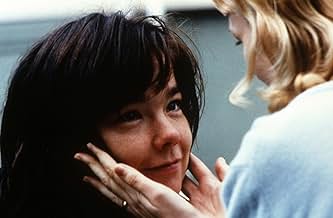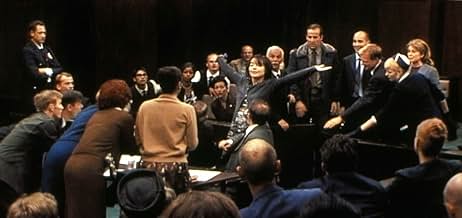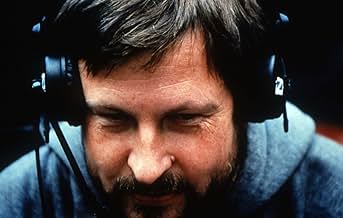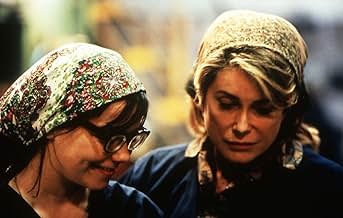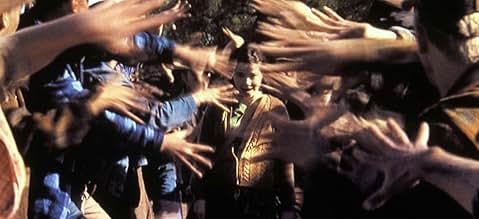Una joven del este de Europa se va a Estados Unidos con su hijo pequeño, con la idea de que será como una película de Hollywood.Una joven del este de Europa se va a Estados Unidos con su hijo pequeño, con la idea de que será como una película de Hollywood.Una joven del este de Europa se va a Estados Unidos con su hijo pequeño, con la idea de que será como una película de Hollywood.
- Nominado para 1 premio Óscar
- 34 premios y 48 nominaciones en total
Siobhan Fallon Hogan
- Brenda
- (as Siobhan Fallon)
Reseñas destacadas
This is distinguishably different from the general Hollywood films or independent projects. It's not like anything done before. LARS VON TRIER, and BJORK, simply blow your mind away: such totality in delivery!
It's gut wrenching - an absorbing tearjerker - but not sentimental. It is in strong doses. (NFE: it may not be for everyone.) The theatre audience was very quiet with occasional sniffing heard. The film may be a fantasy, yet there are subtle jabs at certain social norms and contains hints at how we treat life and lead life.
Bjork made it natural, innocent, and naively good. It is all Bjork matter: she is feeling all the joy and pain and daydreaming, saying all those words, singing all those songs, and dancing along to the music she so ingeniously composed. Lars von Trier once again wrote and delivered a 100% powerful film. He packs all kinds of emotions into 2 hrs. and 20 mins.: from the endearing friendship of two working women Kathy and Selma; to the faithful loving pursuit of Jeff for Selma; to the quiet exchanges of seemingly trusting souls of Bill and Selma; to Selma's son, Bill's wife, the crime, the court, the prison's loneliness within; the anguish pain of a determined mother; and the integrated mood changing musical numbers in-between. One scene of Bjork lying motionless with just one finger moving with quiet sobbing heard is powerful imagery.
Catherine Deneuve as Kathy is well at ease in her supporting role. She continues to exude her charm quietly. You can tell she thoroughly enjoys the company she's in at this production. Musical-wise, Deneuve is no stranger: besides "The Umbrellas of Cherbourg" 1964 - every word in the film was sung, I also remember Jacques Demy's "The Young Girls of Rochefort" 1967 - she danced and sang with her sister Francoise Dorleac, along with Gene Kelly, Michel Piccoli and George Chakiris.
David Morse as Bill (the policeman and neighbor) reminds me of what a memorable performance he delivered in Sean Penn's "The Crossing Guard" 1995 opposite Jack Nicholson and Robin Wright. 'tis great to see Joel Grey dancing again (hm, in the most improbable setting!)
For a 5' 4'' singer-songwriter from Iceland, Bjork is a giant impact in this quiet powerhouse of a film, "Dancer In the Dark." Lars von Trier's vision and confidence in Bjork truly paid off!
It's gut wrenching - an absorbing tearjerker - but not sentimental. It is in strong doses. (NFE: it may not be for everyone.) The theatre audience was very quiet with occasional sniffing heard. The film may be a fantasy, yet there are subtle jabs at certain social norms and contains hints at how we treat life and lead life.
Bjork made it natural, innocent, and naively good. It is all Bjork matter: she is feeling all the joy and pain and daydreaming, saying all those words, singing all those songs, and dancing along to the music she so ingeniously composed. Lars von Trier once again wrote and delivered a 100% powerful film. He packs all kinds of emotions into 2 hrs. and 20 mins.: from the endearing friendship of two working women Kathy and Selma; to the faithful loving pursuit of Jeff for Selma; to the quiet exchanges of seemingly trusting souls of Bill and Selma; to Selma's son, Bill's wife, the crime, the court, the prison's loneliness within; the anguish pain of a determined mother; and the integrated mood changing musical numbers in-between. One scene of Bjork lying motionless with just one finger moving with quiet sobbing heard is powerful imagery.
Catherine Deneuve as Kathy is well at ease in her supporting role. She continues to exude her charm quietly. You can tell she thoroughly enjoys the company she's in at this production. Musical-wise, Deneuve is no stranger: besides "The Umbrellas of Cherbourg" 1964 - every word in the film was sung, I also remember Jacques Demy's "The Young Girls of Rochefort" 1967 - she danced and sang with her sister Francoise Dorleac, along with Gene Kelly, Michel Piccoli and George Chakiris.
David Morse as Bill (the policeman and neighbor) reminds me of what a memorable performance he delivered in Sean Penn's "The Crossing Guard" 1995 opposite Jack Nicholson and Robin Wright. 'tis great to see Joel Grey dancing again (hm, in the most improbable setting!)
For a 5' 4'' singer-songwriter from Iceland, Bjork is a giant impact in this quiet powerhouse of a film, "Dancer In the Dark." Lars von Trier's vision and confidence in Bjork truly paid off!
This is quite possibly the most moving film I've seen, it ensnares you within the first minute, or Bjork does with her interpretation of the sound of music, which is both hilarious and introduces one of the main themes: the magic of musicals. Not one of my favourite genres (but everyone loves The Sound Of Music, right?) but Lars Von Trier makes you re-evaluate your perception with a gentle loving pastiche of the way for no reason people and things in musicals spontaneously erupt into song, made more credible in this film by implicating a reason for it: Bjork's character is going blind so she hears music in the slightest thing and she, in her mind, sees how moves should be choreographed with the music she hears, reminiscent of her own It's Oh So Quiet' music video. And the best thing about this film is the way Bjork charms you with her portrayal of the nicest person in the world, she will do anything for you if she could. She is essentially an innocent and though this is her weakness you can't help but love her all the more: a sparkling performance from a unique singer in real life.
However from this don't assume that this is a light happy film as there is a dark tragic side also, and this side is full of injustice, agony- and I mean agony-, sorrow- like you'd not believe-, and an intense emotional pull as I've ever felt in a cinema before, and it's this half that propels it from being just a great film to becoming one of the greatest. Its greatness is in telling a simple story of a woman trying to stop her own genetic sight disorder afflicting her son, by working every hour to afford the operation, working heavy machinery despite essentially being virtually blind, its greatness is its ability to inflict upon you the gift of feeling every conceivable emotion you posses and you do, you really do experience so much during this film. But I'll not say too much as my enjoyment of this film increased due to, for a change, not second guessing what would happen but to just let it be, I would say to passively watch but there's nothing passive about this film. It really moves you. It makes you feel alive.
This film should be seen alone, in the quiet when you are all by yourself, but more importantly than that it should be seen: this is more than mere movie this is art this is real this is the greatest film I have ever seen: even better than Casablanca, and Shadowlands, and The Piano.
However from this don't assume that this is a light happy film as there is a dark tragic side also, and this side is full of injustice, agony- and I mean agony-, sorrow- like you'd not believe-, and an intense emotional pull as I've ever felt in a cinema before, and it's this half that propels it from being just a great film to becoming one of the greatest. Its greatness is in telling a simple story of a woman trying to stop her own genetic sight disorder afflicting her son, by working every hour to afford the operation, working heavy machinery despite essentially being virtually blind, its greatness is its ability to inflict upon you the gift of feeling every conceivable emotion you posses and you do, you really do experience so much during this film. But I'll not say too much as my enjoyment of this film increased due to, for a change, not second guessing what would happen but to just let it be, I would say to passively watch but there's nothing passive about this film. It really moves you. It makes you feel alive.
This film should be seen alone, in the quiet when you are all by yourself, but more importantly than that it should be seen: this is more than mere movie this is art this is real this is the greatest film I have ever seen: even better than Casablanca, and Shadowlands, and The Piano.
I admit I had to watch this a few times, the music is intriguing and ethereal, but the story seems on a parallel universe of strange, then scary, then a form of horror. But also a story of hope, which is to say, its confusing.
Basically Selma is a Czech immigrant who wants to find a life for herself, she has a secret in that her disease causes her to become at first near-sighted and myopic, she then is nearly blind.
She does not live a pretty life, works in a factory but finds that the machines are rhythmic, and as she also enjoys old musicals from the 40's and 50's this is her form of escape. This is the better part of the story, her spirit and how she endeavors to survive.
I am not a major fan of Bjork but I do like her voice and she is very affecting here, I think I had seen a very odd documentary about her made early in her career.
Am wondering what she is doing lately, as this film is well-acted and she portrays the sad and eventually discarded Selma, in a very convincing yet not trite manner. Good performances also with David Morse, Cara Seymour, Peter Stormare and the always beautiful Catherine Deneuve. 9/10.
Basically Selma is a Czech immigrant who wants to find a life for herself, she has a secret in that her disease causes her to become at first near-sighted and myopic, she then is nearly blind.
She does not live a pretty life, works in a factory but finds that the machines are rhythmic, and as she also enjoys old musicals from the 40's and 50's this is her form of escape. This is the better part of the story, her spirit and how she endeavors to survive.
I am not a major fan of Bjork but I do like her voice and she is very affecting here, I think I had seen a very odd documentary about her made early in her career.
Am wondering what she is doing lately, as this film is well-acted and she portrays the sad and eventually discarded Selma, in a very convincing yet not trite manner. Good performances also with David Morse, Cara Seymour, Peter Stormare and the always beautiful Catherine Deneuve. 9/10.
The reviews were extremely black and white for this art-house film. People were either enthralled or bored to tears by the whole experience. There seemed to be no middle ground. Now, that's my kind of movie. Any picture that can reap awards (Cannes Film Festival) and get lambasted by the general public at the same time will always pique my interest. In respect, it was a rich, rewarding odyssey, much easier to get through than, let's say, even half of "8½."
My initial respect for the unique, uncompromising style of Danish director Lars von Trier goes back to his compelling work in "Zentropa" and "Breaking the Waves," both bleak, surrealistic studies of man vs. reality. His pieces usually center around some innocent, simple-minded, self-sacrificing soul who inevitably succumbs to the cruelties of life.
I found the central role of Selma (as played by the extraordinary Björk) to be very much the emotional equivalent of Emily Watson's touchingly childlike, near-sociopath Bess in "Breaking the Waves" -- blessed and cursed with a naive, soulful purity. Selma represents one of God's little quirks of nature. A bespectacled, pathetically infantile little ragamuffin completely out of touch, Selma has somehow survived like the runt of a litter would - through luck, will power, and the extreme kindness of those around her. An impoverished Czech-born emigré living in a small Northwestern U.S. industrial town during the mid-60s, this luckless creature manages to eek out a meager Airstream-like existence as a factory worker, despite the fact she is legally blind.
Selma is, amazingly enough, a mother. Seemingly ill-equipped to care for a child much less herself, she has nevertheless managed to provide for the 12-year-old boy, while nurturing the child as a young girl would her rag doll. The fairly adjusted boy suffers, however, from the same optic disease as the mother, while the crux of the story revolves around her attempts to save up money for his inevitable operation.
The fascination of "Dancer in the Dark" lies in Selma's musical world. With her eyesight failing, her ears become the only sense of joy, falling periodically into bouts of fantasy anytime she grabs onto a rhythm or beat (like machine sounds, train engines, etc.), wherein she becomes the star of her own working-class musical production. These compelling sequences become mere extensions of her real-life circumstances, i.e., the musical interludes at work will include the factory itself as a set piece and the other workers as her ensemble. A strange mix of Fellini neo-realism and Busby Berkeley illusion, these daydreams (sparked by Vincent Paterson's inventive choreography and von Trier's purposely puerile lyrics) become her only escape. Björk's odd musical talent and vocal style may be an acquired taste, but she is so mesmerizing here it becomes a non-issue. In addition, there are brief moments of levity as a hopelessly inept community theater production of "The Sound of Music" goes into rehearsals with the very awkward Selma playing Maria.
The subordinate cast is equally in tune. The wonderful, beguiling French star Catherine Deneuve downplays her ethereal beauty as Kathy, Selma's co-worker and trusted friend. And a strange, maternalistic friendship it is indeed, for this woman seems to have no other purpose in life than to be this girl's eyes and hands, looking out for her practically day and night. Peter ("Fargo") Stormare shies away from his ruthless killer image with this touching portrayal of a sensitive, almost pitiable boor who only has eyes for the ungainly Selma. David Morse is gripping as a seemingly compassionate but despairing policeman whose one desperate act involving neighbor Selma results in tragedy. Joel Grey has a brief, telling moment near the film's end as a faded musical star idolized by Selma.
As in his other featured works, von Trier's gritty, hand-held camera work may be dizzying to the point of distraction at first but its overall impact to the stark proceedings is unquestionable. Moreover, the grueling paces he puts his actresses through to achieve absolute truth borders on misogyny but the rewards are tenfold. As in the case of Emily Watson, Björk has never shined brighter as an artist.
A harrowing, refreshingly original piece of filmmaking that should be experienced by anybody who dares to be different.
My initial respect for the unique, uncompromising style of Danish director Lars von Trier goes back to his compelling work in "Zentropa" and "Breaking the Waves," both bleak, surrealistic studies of man vs. reality. His pieces usually center around some innocent, simple-minded, self-sacrificing soul who inevitably succumbs to the cruelties of life.
I found the central role of Selma (as played by the extraordinary Björk) to be very much the emotional equivalent of Emily Watson's touchingly childlike, near-sociopath Bess in "Breaking the Waves" -- blessed and cursed with a naive, soulful purity. Selma represents one of God's little quirks of nature. A bespectacled, pathetically infantile little ragamuffin completely out of touch, Selma has somehow survived like the runt of a litter would - through luck, will power, and the extreme kindness of those around her. An impoverished Czech-born emigré living in a small Northwestern U.S. industrial town during the mid-60s, this luckless creature manages to eek out a meager Airstream-like existence as a factory worker, despite the fact she is legally blind.
Selma is, amazingly enough, a mother. Seemingly ill-equipped to care for a child much less herself, she has nevertheless managed to provide for the 12-year-old boy, while nurturing the child as a young girl would her rag doll. The fairly adjusted boy suffers, however, from the same optic disease as the mother, while the crux of the story revolves around her attempts to save up money for his inevitable operation.
The fascination of "Dancer in the Dark" lies in Selma's musical world. With her eyesight failing, her ears become the only sense of joy, falling periodically into bouts of fantasy anytime she grabs onto a rhythm or beat (like machine sounds, train engines, etc.), wherein she becomes the star of her own working-class musical production. These compelling sequences become mere extensions of her real-life circumstances, i.e., the musical interludes at work will include the factory itself as a set piece and the other workers as her ensemble. A strange mix of Fellini neo-realism and Busby Berkeley illusion, these daydreams (sparked by Vincent Paterson's inventive choreography and von Trier's purposely puerile lyrics) become her only escape. Björk's odd musical talent and vocal style may be an acquired taste, but she is so mesmerizing here it becomes a non-issue. In addition, there are brief moments of levity as a hopelessly inept community theater production of "The Sound of Music" goes into rehearsals with the very awkward Selma playing Maria.
The subordinate cast is equally in tune. The wonderful, beguiling French star Catherine Deneuve downplays her ethereal beauty as Kathy, Selma's co-worker and trusted friend. And a strange, maternalistic friendship it is indeed, for this woman seems to have no other purpose in life than to be this girl's eyes and hands, looking out for her practically day and night. Peter ("Fargo") Stormare shies away from his ruthless killer image with this touching portrayal of a sensitive, almost pitiable boor who only has eyes for the ungainly Selma. David Morse is gripping as a seemingly compassionate but despairing policeman whose one desperate act involving neighbor Selma results in tragedy. Joel Grey has a brief, telling moment near the film's end as a faded musical star idolized by Selma.
As in his other featured works, von Trier's gritty, hand-held camera work may be dizzying to the point of distraction at first but its overall impact to the stark proceedings is unquestionable. Moreover, the grueling paces he puts his actresses through to achieve absolute truth borders on misogyny but the rewards are tenfold. As in the case of Emily Watson, Björk has never shined brighter as an artist.
A harrowing, refreshingly original piece of filmmaking that should be experienced by anybody who dares to be different.
Why? Because it's a one of a kind movie. The acting is superb (especially Bjork), direction assured and the musical numbers are great. Still, it's the most depressing film I've ever seen. By the end of the film I was crying practically non-stop. It's so bleak I don't think I'll ever see it again, but it should be seen at least once by everybody. It shows misery and suffering full throttle. You'll either love it or loathe it (I'm somewhere in th middle), but you'll never see anything like it again and you won't forget it. Just bring lots of Kleenex.
¿Sabías que...?
- CuriosidadesIt took Lars von Trier a whole year to convince Björk to play the lead role.
- PifiasSelma's son's surname should be Jezek, not Jezková.
- Citas
Lines on screen: They say it's the last song. They don't know us, you see. It's only the last song if we let it be.
- Versiones alternativasThe film originally contained a song entitled "141 Steps"; however, after the Cannes premiere, director Lars von Trier decided to shorten it, and the song was subsequently reworked and retitled "107 Steps."
- Banda sonoraOverture
Written by Björk
Arranged, Orchestrated & Conducted by Vincent Mendoza
Produced by Björk
Mixed by Mark Stent (as Mark "Spike" Stent)
Published by Universal Music
Selecciones populares
Inicia sesión para calificar y añadir a tu lista para recibir recomendaciones personalizadas
- How long is Dancer in the Dark?Con tecnología de Alexa
Detalles
- Fecha de lanzamiento
- Países de origen
- Sitios oficiales
- Idiomas
- Títulos en diferentes países
- Bailando en la oscuridad
- Localizaciones del rodaje
- Empresas productoras
- Ver más compañías en los créditos en IMDbPro
Taquilla
- Presupuesto
- 12.800.000 US$ (estimación)
- Recaudación en Estados Unidos y Canadá
- 4.184.036 US$
- Fin de semana de estreno en EE. UU. y Canadá
- 91.612 US$
- 24 sept 2000
- Recaudación en todo el mundo
- 40.061.153 US$
- Duración2 horas 15 minutos
- Color
- Mezcla de sonido
- Relación de aspecto
- 2.35 : 1
Contribuir a esta página
Sugerir un cambio o añadir el contenido que falta

Principal laguna de datos
By what name was Bailar en la oscuridad (2000) officially released in India in Hindi?
Responde

